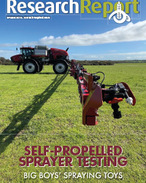This article is 8 years old. Images might not display.
Q fever was first recognised in Australia during the 1930s when workers at a Brisbane meat processor became ill with a fever. As the cause of the illness was unknown, the workers were diagnosed with 'query' fever and eventually abbreviated the disease to Q fever.
NSW Farmers’ Q fever spokesperson, Alexandra Bunton, said raising awareness of Q fever had been a key campaign for NSW Farmers in 2016-17.
“This funding provided by NSW Health is the most significant government contribution to protecting communities against Q fever since the defunding of the National Q fever Management Program in 2006.” Bunton said.
“This is a great result for farmers, as well as rural and regional communities,” she said.
Bunton said improving the community’s understanding of Q fever risk is an important first step in reducing the number of disease notifications seen each year.
NSW Farmers has called for state and federal governments to fund a Q fever awareness campaign, as well as providing specific Q fever training for rural GPs and subsidising the costly testing and vaccination process for people at risk.
Along with a number of other industry and community groups, NSW Farmers is also seeking to have the Q fever vaccine returned to the Pharmaceutical Benefits Scheme.
“We’re pleased that the state government has also committed to provide online Q fever training modules as part of continuing education programs for GPs,” Bunton said.
“We envisage that this will increase farmers’ ability to access testing and vaccination services as more doctors receive appropriate training to interpret test results and administer the vaccine.”
Bunton said NSW Farmers would continue to lobby to reduce the cost of the Q fever test and vaccine for farmers and farm workers.
“The biggest impediment to increasing vaccine coverage is the cost of Q fever consultation, which can be up to $500 if you are exposed to Q fever as part of your employment – including for farmers.”
“Subsidised vaccination clinics, better awareness of disease risk, and a greater number of GPs trained to vaccinate for Q fever will increase the number of people vaccinated and, ultimately, significantly reduce the cases of this debilitating disease,” Ms Bunton concluded.
With the possible exception of a few European countries and New Zealand, cases of Q fever have been reported worldwide and from every State and Territory in Australia.























